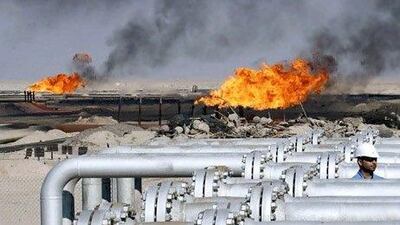It's time to replace the tired narrative of "oil wars" with an informed, nuanced appreciation of the real motivations behind conflict.
The idea that wars fought by western powers - including Afghanistan, Iraq and now Libya - had the aim of seizing oil supplies has become a staple of "anti-imperialist" dialogue.
The concept appears to be that the western countries will ensure their oil companies profit from these countries' resources. Or, in Donald Trump's cruder version of the theory that "to the victor go the spoils", when he proposed the US should simply seize what he estimated as US$15 trillion (Dh55.09tn) worth of Iraqi oil.
Alain Juppé, the French foreign minister, added fuel to this controversy with his ill-considered comments on September 1 that it was "fair and logical" for French companies to be favoured for contracts, given their aid to the new government in Libya. This coincided with a letter, probably a fake, and denied by both parties, that transitional authorities had promised 35 per cent of Libyan oil to the French in return for their support.
Robert Fisk, the veteran journalist, suggested: "If Libya's national export was potatoes, the West would no more have intervened than it would have invaded Iraq if Saddam Hussein's principal resource was asparagus."
Yet this ignores that the West intervened successfully (if sometimes belatedly) to stop massacres in non-oil states Sierra Leone, Kosovo, Bosnia and Haiti, and to end Côte d'Ivoire's civil war. Conspiracy theorists have not delved into the use of military force to secure supplies of coffee, cocoa and mangoes.
And despite neoconservative fantasies, Iraq's oil industry has not been privatised, and the country has not left Opec. Apart from British and American companies, the US appears to have spent $3tn so Iraqi oil deals can go to Chinese, Russian, Japanese, Malaysian, Indian, Korean and even Angolan corporations.
The contracts for Iraq's massive oil reserves are not highly lucrative: with oil prices still hovering around $100 per barrel, the companies will net between $1 and $2 per barrel, on which they pay tax.
From the largest field, Rumaila, BP will make about $500 million annually. This might sound substantial, but it is less than the UK raises from taxing sand. And BP will pay very little tax in the UK on its overseas profits.
Before the Libyan war, most of its oil exports went to Europe, and the leading foreign companies active there were French, Italian, German, Spanish, Canadian and American. Much attention has focused on potential oil and gas deals for Qatar, spearhead of the Libyan intervention among Arab states.
Yet the idea that these slim rewards were the main temptation for such a wealthy country to embark on this risky course of action is ludicrous.
Is it too difficult to think through other reasons — moral, political and economic - why Nato and some Arab nations might have chosen to intervene in Libya?
These include genuine humanitarian concerns that Muammar Qaddafi's victorious forces would have slaughtered civilians and enforced a reign of terror. As with Rwanda and Bosnia, the West's failure to prevent a massacre would have stained its reputation. Bashar Al Assad, the president of Syria, and other regional leaders would have been emboldened and would have learnt the lesson that violence would keep them in power.
On the political side, despite his more recent rapprochement, Colonel Qaddafi had been a sponsor of terrorists and rebel groups for many years, hurting not just the West but also spreading chaos throughout North, East and West Africa.
The benefits of a friendly, pro-western and hopefully democratic state are clear, especially one bordering the new Egypt, whose allegiance is suddenly in doubt.
Had the Libyan conflict dragged on, and the country been partitioned, it might have become a haven for terrorists and pirates, and a source of a flood of refugees to Europe.
From Qatar's point of view, Col Qaddafi's overthrow gains it a useful ally within the Arab world and in Opec. Additionally, it further raises its international profile and banks a favour with western nations that it may be able to cash at an opportune moment. The US liberation of Kuwait from Saddam Hussein illustrated how much small, wealthy Gulf nations need powerful friends.
In economics, Libya's value lies not in the awarding of an oil contract to BP or Total or Qatar Petroleum rather than a Russian or Chinese company. Much more significant is a well-managed oil industry - whether nationalised or privatised - a more diversified economy open to trade with Europe, and the potential for lucrative deals in property, telecommunications, arms, sovereign wealth investments and other parts of the economy.
Instead of crude conspiracy theories and ill-thought out rhetoric, insights come by considering each conflict on its own terms, and untangling the complex strategic motives of the participants. We do not need naively to expect purely humanitarian motives for military intervention - but it would be equally wrong to ascribe them solely to cynical Realpolitik, or the monomaniac quest for a slippery black liquid.
Robin Mills is an energy economist based in Dubai, and author of The Myth of the Oil Crisis and Capturing Carbon


